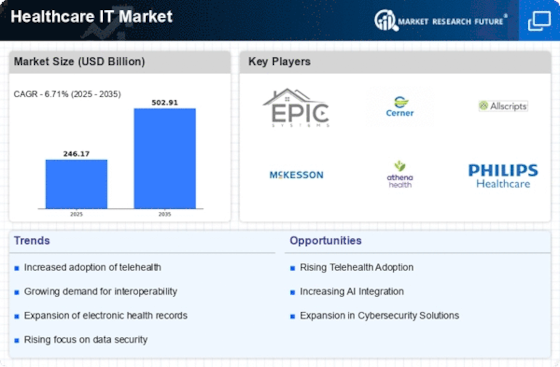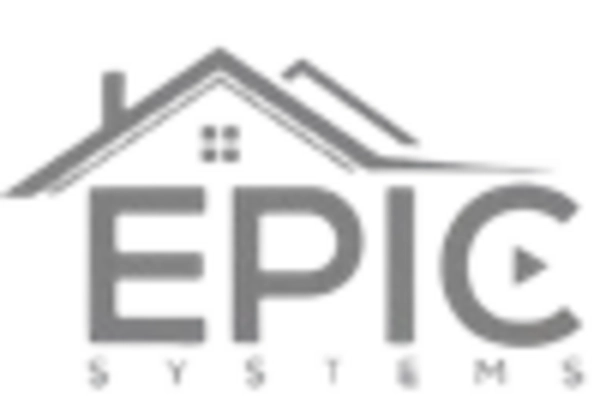Electronic Health Records
Telemedicine
Healthcare Analytics
Patient Engagement Solutions
Healthcare Information Exchange
Hospitals
Ambulatory Surgical Centers
Clinics
Pharmaceutical Companies
Research Organizations
On-Premise
Cloud-Based
Hybrid
Administrative Solutions
Clinical Solutions
Financial Solutions
North America
Europe
South America
Asia Pacific
Middle East and Africa
North America Outlook (USD Billion, 2019-2035)
North America Healthcare IT Market by Application Type
Electronic Health Records
Telemedicine
Healthcare Analytics
Patient Engagement Solutions
Healthcare Information Exchange
North America Healthcare IT Market by End User Type
Hospitals
Ambulatory Surgical Centers
Clinics
Pharmaceutical Companies
Research Organizations
North America Healthcare IT Market by Deployment Mode Type
On-Premise
Cloud-Based
Hybrid
North America Healthcare IT Market by Functionality Type
Administrative Solutions
Clinical Solutions
Financial Solutions
North America Healthcare IT Market by Regional Type
US
Canada
US Outlook (USD Billion, 2019-2035)
US Healthcare IT Market by Application Type
Electronic Health Records
Telemedicine
Healthcare Analytics
Patient Engagement Solutions
Healthcare Information Exchange
US Healthcare IT Market by End User Type
Hospitals
Ambulatory Surgical Centers
Clinics
Pharmaceutical Companies
Research Organizations
US Healthcare IT Market by Deployment Mode Type
On-Premise
Cloud-Based
Hybrid
US Healthcare IT Market by Functionality Type
Administrative Solutions
Clinical Solutions
Financial Solutions
CANADA Outlook (USD Billion, 2019-2035)
CANADA Healthcare IT Market by Application Type
Electronic Health Records
Telemedicine
Healthcare Analytics
Patient Engagement Solutions
Healthcare Information Exchange
CANADA Healthcare IT Market by End User Type
Hospitals
Ambulatory Surgical Centers
Clinics
Pharmaceutical Companies
Research Organizations
CANADA Healthcare IT Market by Deployment Mode Type
On-Premise
Cloud-Based
Hybrid
CANADA Healthcare IT Market by Functionality Type
Administrative Solutions
Clinical Solutions
Financial Solutions
Europe Outlook (USD Billion, 2019-2035)
Europe Healthcare IT Market by Application Type
Electronic Health Records
Telemedicine
Healthcare Analytics
Patient Engagement Solutions
Healthcare Information Exchange
Europe Healthcare IT Market by End User Type
Hospitals
Ambulatory Surgical Centers
Clinics
Pharmaceutical Companies
Research Organizations
Europe Healthcare IT Market by Deployment Mode Type
On-Premise
Cloud-Based
Hybrid
Europe Healthcare IT Market by Functionality Type
Administrative Solutions
Clinical Solutions
Financial Solutions
Europe Healthcare IT Market by Regional Type
Germany
UK
France
Russia
Italy
Spain
Rest of Europe
GERMANY Outlook (USD Billion, 2019-2035)
GERMANY Healthcare IT Market by Application Type
Electronic Health Records
Telemedicine
Healthcare Analytics
Patient Engagement Solutions
Healthcare Information Exchange
GERMANY Healthcare IT Market by End User Type
Hospitals
Ambulatory Surgical Centers
Clinics
Pharmaceutical Companies
Research Organizations
GERMANY Healthcare IT Market by Deployment Mode Type
On-Premise
Cloud-Based
Hybrid
GERMANY Healthcare IT Market by Functionality Type
Administrative Solutions
Clinical Solutions
Financial Solutions
UK Outlook (USD Billion, 2019-2035)
UK Healthcare IT Market by Application Type
Electronic Health Records
Telemedicine
Healthcare Analytics
Patient Engagement Solutions
Healthcare Information Exchange
UK Healthcare IT Market by End User Type
Hospitals
Ambulatory Surgical Centers
Clinics
Pharmaceutical Companies
Research Organizations
UK Healthcare IT Market by Deployment Mode Type
On-Premise
Cloud-Based
Hybrid
UK Healthcare IT Market by Functionality Type
Administrative Solutions
Clinical Solutions
Financial Solutions
FRANCE Outlook (USD Billion, 2019-2035)
FRANCE Healthcare IT Market by Application Type
Electronic Health Records
Telemedicine
Healthcare Analytics
Patient Engagement Solutions
Healthcare Information Exchange
FRANCE Healthcare IT Market by End User Type
Hospitals
Ambulatory Surgical Centers
Clinics
Pharmaceutical Companies
Research Organizations
FRANCE Healthcare IT Market by Deployment Mode Type
On-Premise
Cloud-Based
Hybrid
FRANCE Healthcare IT Market by Functionality Type
Administrative Solutions
Clinical Solutions
Financial Solutions
RUSSIA Outlook (USD Billion, 2019-2035)
RUSSIA Healthcare IT Market by Application Type
Electronic Health Records
Telemedicine
Healthcare Analytics
Patient Engagement Solutions
Healthcare Information Exchange
RUSSIA Healthcare IT Market by End User Type
Hospitals
Ambulatory Surgical Centers
Clinics
Pharmaceutical Companies
Research Organizations
RUSSIA Healthcare IT Market by Deployment Mode Type
On-Premise
Cloud-Based
Hybrid
RUSSIA Healthcare IT Market by Functionality Type
Administrative Solutions
Clinical Solutions
Financial Solutions
ITALY Outlook (USD Billion, 2019-2035)
ITALY Healthcare IT Market by Application Type
Electronic Health Records
Telemedicine
Healthcare Analytics
Patient Engagement Solutions
Healthcare Information Exchange
ITALY Healthcare IT Market by End User Type
Hospitals
Ambulatory Surgical Centers
Clinics
Pharmaceutical Companies
Research Organizations
ITALY Healthcare IT Market by Deployment Mode Type
On-Premise
Cloud-Based
Hybrid
ITALY Healthcare IT Market by Functionality Type
Administrative Solutions
Clinical Solutions
Financial Solutions
SPAIN Outlook (USD Billion, 2019-2035)
SPAIN Healthcare IT Market by Application Type
Electronic Health Records
Telemedicine
Healthcare Analytics
Patient Engagement Solutions
Healthcare Information Exchange
SPAIN Healthcare IT Market by End User Type
Hospitals
Ambulatory Surgical Centers
Clinics
Pharmaceutical Companies
Research Organizations
SPAIN Healthcare IT Market by Deployment Mode Type
On-Premise
Cloud-Based
Hybrid
SPAIN Healthcare IT Market by Functionality Type
Administrative Solutions
Clinical Solutions
Financial Solutions
REST OF EUROPE Outlook (USD Billion, 2019-2035)
REST OF EUROPE Healthcare IT Market by Application Type
Electronic Health Records
Telemedicine
Healthcare Analytics
Patient Engagement Solutions
Healthcare Information Exchange
REST OF EUROPE Healthcare IT Market by End User Type
Hospitals
Ambulatory Surgical Centers
Clinics
Pharmaceutical Companies
Research Organizations
REST OF EUROPE Healthcare IT Market by Deployment Mode Type
On-Premise
Cloud-Based
Hybrid
REST OF EUROPE Healthcare IT Market by Functionality Type
Administrative Solutions
Clinical Solutions
Financial Solutions
APAC Outlook (USD Billion, 2019-2035)
APAC Healthcare IT Market by Application Type
Electronic Health Records
Telemedicine
Healthcare Analytics
Patient Engagement Solutions
Healthcare Information Exchange
APAC Healthcare IT Market by End User Type
Hospitals
Ambulatory Surgical Centers
Clinics
Pharmaceutical Companies
Research Organizations
APAC Healthcare IT Market by Deployment Mode Type
On-Premise
Cloud-Based
Hybrid
APAC Healthcare IT Market by Functionality Type
Administrative Solutions
Clinical Solutions
Financial Solutions
APAC Healthcare IT Market by Regional Type
China
India
Japan
South Korea
Malaysia
Thailand
Indonesia
Rest of APAC
CHINA Outlook (USD Billion, 2019-2035)
CHINA Healthcare IT Market by Application Type
Electronic Health Records
Telemedicine
Healthcare Analytics
Patient Engagement Solutions
Healthcare Information Exchange
CHINA Healthcare IT Market by End User Type
Hospitals
Ambulatory Surgical Centers
Clinics
Pharmaceutical Companies
Research Organizations
CHINA Healthcare IT Market by Deployment Mode Type
On-Premise
Cloud-Based
Hybrid
CHINA Healthcare IT Market by Functionality Type
Administrative Solutions
Clinical Solutions
Financial Solutions
INDIA Outlook (USD Billion, 2019-2035)
INDIA Healthcare IT Market by Application Type
Electronic Health Records
Telemedicine
Healthcare Analytics
Patient Engagement Solutions
Healthcare Information Exchange
INDIA Healthcare IT Market by End User Type
Hospitals
Ambulatory Surgical Centers
Clinics
Pharmaceutical Companies
Research Organizations
INDIA Healthcare IT Market by Deployment Mode Type
On-Premise
Cloud-Based
Hybrid
INDIA Healthcare IT Market by Functionality Type
Administrative Solutions
Clinical Solutions
Financial Solutions
JAPAN Outlook (USD Billion, 2019-2035)
JAPAN Healthcare IT Market by Application Type
Electronic Health Records
Telemedicine
Healthcare Analytics
Patient Engagement Solutions
Healthcare Information Exchange
JAPAN Healthcare IT Market by End User Type
Hospitals
Ambulatory Surgical Centers
Clinics
Pharmaceutical Companies
Research Organizations
JAPAN Healthcare IT Market by Deployment Mode Type
On-Premise
Cloud-Based
Hybrid
JAPAN Healthcare IT Market by Functionality Type
Administrative Solutions
Clinical Solutions
Financial Solutions
SOUTH KOREA Outlook (USD Billion, 2019-2035)
SOUTH KOREA Healthcare IT Market by Application Type
Electronic Health Records
Telemedicine
Healthcare Analytics
Patient Engagement Solutions
Healthcare Information Exchange
SOUTH KOREA Healthcare IT Market by End User Type
Hospitals
Ambulatory Surgical Centers
Clinics
Pharmaceutical Companies
Research Organizations
SOUTH KOREA Healthcare IT Market by Deployment Mode Type
On-Premise
Cloud-Based
Hybrid
SOUTH KOREA Healthcare IT Market by Functionality Type
Administrative Solutions
Clinical Solutions
Financial Solutions
MALAYSIA Outlook (USD Billion, 2019-2035)
MALAYSIA Healthcare IT Market by Application Type
Electronic Health Records
Telemedicine
Healthcare Analytics
Patient Engagement Solutions
Healthcare Information Exchange
MALAYSIA Healthcare IT Market by End User Type
Hospitals
Ambulatory Surgical Centers
Clinics
Pharmaceutical Companies
Research Organizations
MALAYSIA Healthcare IT Market by Deployment Mode Type
On-Premise
Cloud-Based
Hybrid
MALAYSIA Healthcare IT Market by Functionality Type
Administrative Solutions
Clinical Solutions
Financial Solutions
THAILAND Outlook (USD Billion, 2019-2035)
THAILAND Healthcare IT Market by Application Type
Electronic Health Records
Telemedicine
Healthcare Analytics
Patient Engagement Solutions
Healthcare Information Exchange
THAILAND Healthcare IT Market by End User Type
Hospitals
Ambulatory Surgical Centers
Clinics
Pharmaceutical Companies
Research Organizations
THAILAND Healthcare IT Market by Deployment Mode Type
On-Premise
Cloud-Based
Hybrid
THAILAND Healthcare IT Market by Functionality Type
Administrative Solutions
Clinical Solutions
Financial Solutions
INDONESIA Outlook (USD Billion, 2019-2035)
INDONESIA Healthcare IT Market by Application Type
Electronic Health Records
Telemedicine
Healthcare Analytics
Patient Engagement Solutions
Healthcare Information Exchange
INDONESIA Healthcare IT Market by End User Type
Hospitals
Ambulatory Surgical Centers
Clinics
Pharmaceutical Companies
Research Organizations
INDONESIA Healthcare IT Market by Deployment Mode Type
On-Premise
Cloud-Based
Hybrid
INDONESIA Healthcare IT Market by Functionality Type
Administrative Solutions
Clinical Solutions
Financial Solutions
REST OF APAC Outlook (USD Billion, 2019-2035)
REST OF APAC Healthcare IT Market by Application Type
Electronic Health Records
Telemedicine
Healthcare Analytics
Patient Engagement Solutions
Healthcare Information Exchange
REST OF APAC Healthcare IT Market by End User Type
Hospitals
Ambulatory Surgical Centers
Clinics
Pharmaceutical Companies
Research Organizations
REST OF APAC Healthcare IT Market by Deployment Mode Type
On-Premise
Cloud-Based
Hybrid
REST OF APAC Healthcare IT Market by Functionality Type
Administrative Solutions
Clinical Solutions
Financial Solutions
South America Outlook (USD Billion, 2019-2035)
South America Healthcare IT Market by Application Type
Electronic Health Records
Telemedicine
Healthcare Analytics
Patient Engagement Solutions
Healthcare Information Exchange
South America Healthcare IT Market by End User Type
Hospitals
Ambulatory Surgical Centers
Clinics
Pharmaceutical Companies
Research Organizations
South America Healthcare IT Market by Deployment Mode Type
On-Premise
Cloud-Based
Hybrid
South America Healthcare IT Market by Functionality Type
Administrative Solutions
Clinical Solutions
Financial Solutions
South America Healthcare IT Market by Regional Type
Brazil
Mexico
Argentina
Rest of South America
BRAZIL Outlook (USD Billion, 2019-2035)
BRAZIL Healthcare IT Market by Application Type
Electronic Health Records
Telemedicine
Healthcare Analytics
Patient Engagement Solutions
Healthcare Information Exchange
BRAZIL Healthcare IT Market by End User Type
Hospitals
Ambulatory Surgical Centers
Clinics
Pharmaceutical Companies
Research Organizations
BRAZIL Healthcare IT Market by Deployment Mode Type
On-Premise
Cloud-Based
Hybrid
BRAZIL Healthcare IT Market by Functionality Type
Administrative Solutions
Clinical Solutions
Financial Solutions
MEXICO Outlook (USD Billion, 2019-2035)
MEXICO Healthcare IT Market by Application Type
Electronic Health Records
Telemedicine
Healthcare Analytics
Patient Engagement Solutions
Healthcare Information Exchange
MEXICO Healthcare IT Market by End User Type
Hospitals
Ambulatory Surgical Centers
Clinics
Pharmaceutical Companies
Research Organizations
MEXICO Healthcare IT Market by Deployment Mode Type
On-Premise
Cloud-Based
Hybrid
MEXICO Healthcare IT Market by Functionality Type
Administrative Solutions
Clinical Solutions
Financial Solutions
ARGENTINA Outlook (USD Billion, 2019-2035)
ARGENTINA Healthcare IT Market by Application Type
Electronic Health Records
Telemedicine
Healthcare Analytics
Patient Engagement Solutions
Healthcare Information Exchange
ARGENTINA Healthcare IT Market by End User Type
Hospitals
Ambulatory Surgical Centers
Clinics
Pharmaceutical Companies
Research Organizations
ARGENTINA Healthcare IT Market by Deployment Mode Type
On-Premise
Cloud-Based
Hybrid
ARGENTINA Healthcare IT Market by Functionality Type
Administrative Solutions
Clinical Solutions
Financial Solutions
REST OF SOUTH AMERICA Outlook (USD Billion, 2019-2035)
REST OF SOUTH AMERICA Healthcare IT Market by Application Type
Electronic Health Records
Telemedicine
Healthcare Analytics
Patient Engagement Solutions
Healthcare Information Exchange
REST OF SOUTH AMERICA Healthcare IT Market by End User Type
Hospitals
Ambulatory Surgical Centers
Clinics
Pharmaceutical Companies
Research Organizations
REST OF SOUTH AMERICA Healthcare IT Market by Deployment Mode Type
On-Premise
Cloud-Based
Hybrid
REST OF SOUTH AMERICA Healthcare IT Market by Functionality Type
Administrative Solutions
Clinical Solutions
Financial Solutions
MEA Outlook (USD Billion, 2019-2035)
MEA Healthcare IT Market by Application Type
Electronic Health Records
Telemedicine
Healthcare Analytics
Patient Engagement Solutions
Healthcare Information Exchange
MEA Healthcare IT Market by End User Type
Hospitals
Ambulatory Surgical Centers
Clinics
Pharmaceutical Companies
Research Organizations
MEA Healthcare IT Market by Deployment Mode Type
On-Premise
Cloud-Based
Hybrid
MEA Healthcare IT Market by Functionality Type
Administrative Solutions
Clinical Solutions
Financial Solutions
MEA Healthcare IT Market by Regional Type
GCC Countries
South Africa
Rest of MEA
GCC COUNTRIES Outlook (USD Billion, 2019-2035)
GCC COUNTRIES Healthcare IT Market by Application Type
Electronic Health Records
Telemedicine
Healthcare Analytics
Patient Engagement Solutions
Healthcare Information Exchange
GCC COUNTRIES Healthcare IT Market by End User Type
Hospitals
Ambulatory Surgical Centers
Clinics
Pharmaceutical Companies
Research Organizations
GCC COUNTRIES Healthcare IT Market by Deployment Mode Type
On-Premise
Cloud-Based
Hybrid
GCC COUNTRIES Healthcare IT Market by Functionality Type
Administrative Solutions
Clinical Solutions
Financial Solutions
SOUTH AFRICA Outlook (USD Billion, 2019-2035)
SOUTH AFRICA Healthcare IT Market by Application Type
Electronic Health Records
Telemedicine
Healthcare Analytics
Patient Engagement Solutions
Healthcare Information Exchange
SOUTH AFRICA Healthcare IT Market by End User Type
Hospitals
Ambulatory Surgical Centers
Clinics
Pharmaceutical Companies
Research Organizations
SOUTH AFRICA Healthcare IT Market by Deployment Mode Type
On-Premise
Cloud-Based
Hybrid
SOUTH AFRICA Healthcare IT Market by Functionality Type
Administrative Solutions
Clinical Solutions
Financial Solutions
REST OF MEA Outlook (USD Billion, 2019-2035)
REST OF MEA Healthcare IT Market by Application Type
Electronic Health Records
Telemedicine
Healthcare Analytics
Patient Engagement Solutions
Healthcare Information Exchange
REST OF MEA Healthcare IT Market by End User Type
Hospitals
Ambulatory Surgical Centers
Clinics
Pharmaceutical Companies
Research Organizations
REST OF MEA Healthcare IT Market by Deployment Mode Type
On-Premise
Cloud-Based
Hybrid
REST OF MEA Healthcare IT Market by Functionality Type
Administrative Solutions
Clinical Solutions
Financial Solutions


















Leave a Comment